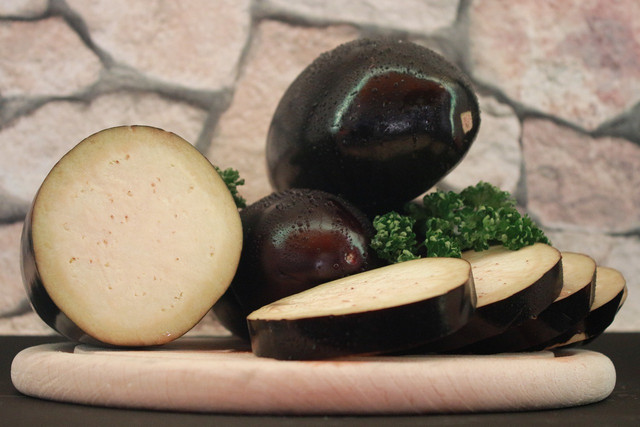If you want to store eggplant, there are a few things to consider. We’ll take a look at how to preserve eggplants, pick the freshest ones and what temperature works best.
Eggplant is a nightshade plant native to Southeast Asia. This vegetable, also known as aubergine, is commonly found in Mediterranean cuisine. They come in many different colors, shapes, and sizes — with dark purple being the most well-known in North America.
When cooking with eggplant, it is best to choose organic whenever possible. If you shop local, you also avoid long, energy-intensive transport routes. You will often find eggplants at farmers’ markets between July and October, depending on what area of the country you live in.
Preserving Eggplants by Choosing Well

When buying eggplants, you should pay attention to the quality and degree of ripeness. Wondering how to tell a ripe eggplant from an unripe one? Here are a few tips:
- A ripe eggplant is firm and has shiny skin. When pressed gently, it gives way slightly.
- If the eggplant does not give way when you press, it’s still unripe and won’t have much flavor. A soft eggplant will spoil quickly.
While it’s no problem to store eggplants for a few days, they do taste best when you prepare them freshly. However, you should not eat eggplant raw.
Things to Consider When Storing Eggplants
- Store eggplants in a cool and dark place, like a pantry or cellar. Temperatures between 50-55˚F are good. Properly stored eggplants keep fresh for about three to four days.
- Fridges are typically too cold to store eggplant, however, storing them in the crisper is better than leaving them at room temperature.
- It is best to wrap the eggplant in a paper (or cloth) towel to absorb excess moisture and place them in a reusable container. Alternatively, you can put them loose in the vegetable compartment of your refrigerator, but they won’t last as long.
- Eggplant stored in the refrigerator quickly shrivels and becomes soft. Plan to use them within the next day or two.
How to Store Eggplants Sliced



Cut-up eggplant can be kept cool until the next day before it spoils. Here’s the best way to store it:
- Put the sliced eggplant in an airtight reusable container.
- Keep the container in the fridge and use the leftover eggplant soon.
- Remove the dried, cut part of the eggplant and wash the eggplant again.
Eggplant slices turn brown quite quickly when exposed to air. It’s best to cook or roast them immediately and not store them raw. Plus, you can extend the life a bit more by cooking them – cooked and roasted eggplant dishes can be stored in the refrigerator for two to three days!
How to Store Eggplant in the Freezer
If you’re looking for the best way to store eggplant for a longer period, use your freezer. When frozen, eggplants can be kept for up to nine months. Here’s how to preserve eggplants in the freezer:
- Wash them thoroughly and cut them into cubes
- Blanch the eggplant pieces for three minutes, remove from the hot water and cool immediately in ice water
- Drain the pieces well in a sieve or dab them dry with a tea towel.
- Store the blanched eggplant in a reusable container or jar in your freezer. Read more: Freezing Foods Without Plastic
- Label the container, so you know that you’re storing eggplant. Write the date on the label as well. This will help you keep track of things in your freezer.
You can make eggplant-based meals in many ways, and that goes for both fresh and frozen. That said, frozen eggplant is great for making soups, sauces, and spreads!
Important Information regarding Health-related Topics.
** Links to retailers marked with ** or underlined orange are partially partner links: If you buy here, you actively support Utopia.org, because we will receive a small part of the sales proceeds. More info.Do you like this post?








